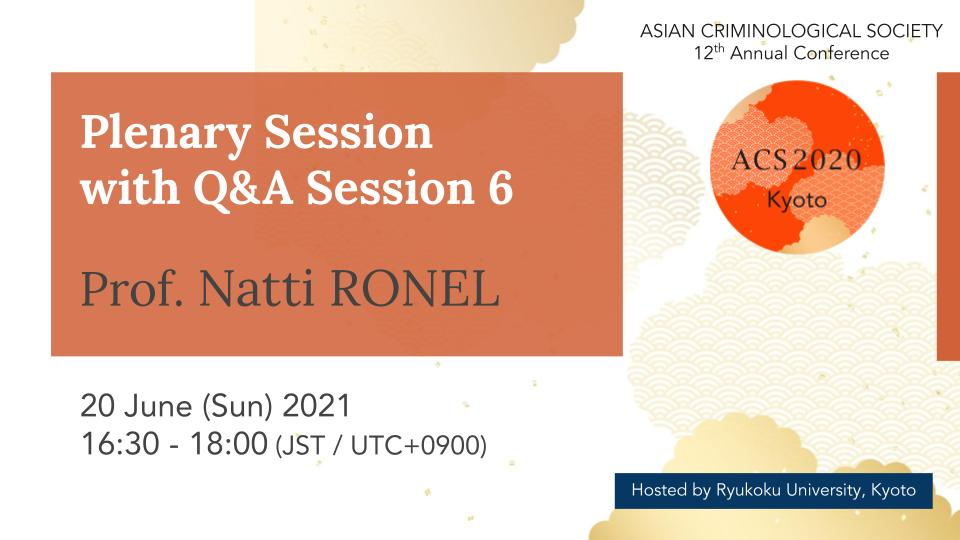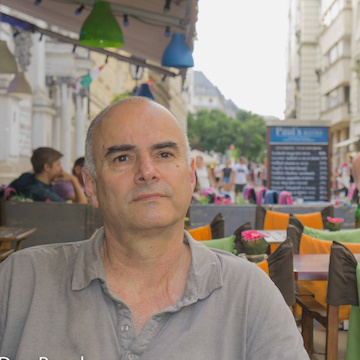2021.08.06
[Report of the ACS2020] Plenary Session with Q&A Session_Prof. Natti Ronel
Spiritual and Positive Criminology - contemporary applications of established knowledge
The Asian Criminological Society 12th Annual Conference (ACS2020), hosted by Ryukoku University, was held online for four days from June 18 to 21, 2021. The purpose of the conference, the second of its kind to be held in Japan after the 2014 Osaka conference, was to promote the growth of criminology in Asia and Oceania, and to promote academic exchange with advanced regions of criminology such as the United States and Europe.
>> ACS2020 Program https://acs2020.org/program.html
The overall theme of the conference is "Crime and Punishment under Asian Cultures: Tradition and Innovation in Criminology". The aim was to promote understanding of the social systems and culture and measures against crime and delinquency in Japan, which is said to be "the country with the least crime in the world".
The following is a summary of the Plenary Session with Q&A Session, which was held live streaming at the conference.
- Plenary Speaker: Natti Ronel (Professor, Faculty of Social Sciences, Bar-Ilan University, Israel)
- Chair: Hiroshi Tsutomi (Professor, the school of International Relations, University of Shizuoka, Japan)
- Date: 16:30-18:00, 20 June, 2021
- Keywords: Positive Criminology, Spiritual Criminology, Spirituality


Natti Ronel (Professor, Faculty of Social Sciences, Bar-Ilan University, Israel)
What embodies the distilled essence of criminality? Positive criminology typically indicates any form of criminality to inevitably involve a process of separation and disintegration, being revealed in three related levels: Interpersonal, intrapersonal, and spiritual. Consequently, positive criminology continuously emphasizes successful integration as a leading means for crime desistance and offender rehabilitation. Spiritual criminology adds on it conscious attempt to bring together a universal essence of spiritual integrative knowledge which was intensively developed in Asian various cultures (e.g., vital religions). While diverse cultures might traditionally maintain different outlooks on spirituality, they all share a commonality that exists at their root of spirituality, which is also adopted by spiritual criminology. Accordingly, any form of criminality typically entails a marked degree of self-centeredness of those involved. Self-centeredness relates to an individual’s over-occupation with their needs, risks, desires, and expectations. It indicates the individual's personal level of ignorance, the degree of self-identification with one’s ego, or the individual's distance from God. At times, it might be projected into a certain group of belonging, to become group self-centeredness. Self-centeredness refers to a fundamental separation on the spiritual level, usually expressed also and influenced by the individual's intrapersonal and interpersonal levels of separation. Crime desistance and offender rehabilitation can be soundly achieved by a growing decrease of self-centeredness, in addition to employing integrating means. This might be exemplified by the Covid-19 pandemic and the worldwide official response of the authorities, which unfortunately increased social distance and personal fears. Consequently, it increased self-centeredness, which resulted in an increase of related phenomena such as substance abuse and addiction, domestic violence, and suicide. Both positive and spiritual criminology call for reversing this process by any attempt to increase faith and hope and to allow social opportunities for growing integration. Such means are estimated to have positive public health outcomes.
Summary of the Q&A Session
Question 1: What is the relationship between spiritual criminology and positive criminology?
Answer 1: Spiritual criminology goes beyond the usual distinctions of positive and negative, good and evil.
Question 2: Can your report today be applied to secular situations?
Answer 2: Today, I talked about spirituality, not about religion. Both secular and religious people do good and share similar experiences.
Question 3: If being a volunteer is so important, what is the significance of being an expert?
Answer 3: When you are an expert, you are firstly a volunteer who unconditionally wants to help others, beyond which you have the added value of being an expert.
Question 4: I would like to learn more about spiritual criminology and its relationship to religion. I am interested in religion as a political issue. What forms of religion and spirituality are beneficial to society? Who decides this and how? If there are inmates in prison who follow an antisocial religion, should they be allowed to practice their beliefs?
Answer 4: Religion is the act of praying and performing rituals, while spirituality is what is in the mind of the person performing the act. The separation is a shift from self-centeredness to other-centeredness and God-centeredness. Religious groups and gangs are self-centered if they are separated from society. It is difficult to determine what is self-centered and what is not. Rather, we can only say that we hope to grow out of that self-centeredness.
Question 5: I have been doing research on ”Aum Shinrikyo". I have met many prison chaplains, but none of them belong to Aum Shinrikyo. To define a religion as good or bad is to give the government the authority to define which religions are good or bad. I think there is a common interest in this point.
Answer 5: Any power has the potential for abuse. Crime is an abuse of power, and prisons are places where power is abused. Massacres have been committed in the name of religion. This is why spiritual criminology tries to provide ideas that go beyond the distinction between good and evil and focus on the battle against self-centeredness.
Question 6: The concept of self-centeredness is central to the argument, but why is suicide, in which the self is killed, a manifestation of self-centeredness?
Answer 6: Self-centeredness refers to a situation in which one is occupied with oneself. Suicide or self-injury is a kind of proof that one can control one's life. Suicide means to end the pain, which is a sign of self-centeredness.
Question 7: Could you provide us with more information about your clinical practice?
Answer 7: I have published a book on psychotherapy called "Twelve Tools," which is similar to the Twelve Steps. I treat a wide variety of people, from rich to poor. Some are drug addicts, some are sex addicts, some are violent, some are sexually violent. Some of my patients are Orthodox Jews. They are very religious, but many of them are sex addicts. Sex is legal, so they are not sex offenders, but there is no spirituality in this case. In the initial interview, I ask about their belief systems and religion. This is a good starting point. Sexually addicted people are constantly thinking about sex and are caught up in it. This treatment is difficult but possible.
Question 8: In recent years measures of the Ministry of Justice and the Ministry of Health have led to reversals. Addiction has become the focus of treatment and correction. What can be done to overcome this?
Answer 8: The government has nothing inherently to do with Alcoholics Anonymous (AA) or Narcotics Anonymous (NA). I teach a 12-step program at university and send my students to AA and NA programs as part of their education. In Israel, the government has provided facilities to help NA, and NA has been established in various cities. I would like to see more cooperation from the groups.
Question 9: In Japan, the elderly are isolated from society and many of them are in prison for committing crimes. How can we solve this problem?
Answer 9: If we build halfway houses, we will end up building another prison. Instead, it is important to rent a house locally and create a community, which is cheaper for the government. AA, NA, etc. can also be used in such communities to bridge the gap between society and those on the periphery of society.
Question 10: I want to know about the philosophy behind your spiritual criminology.
Answer 10: My source is the 12 steps, and I have traveled in search of spirituality within me. I've been to Japan, I've done Zen, I've been to India. The root of their commonality is something greater than the self.